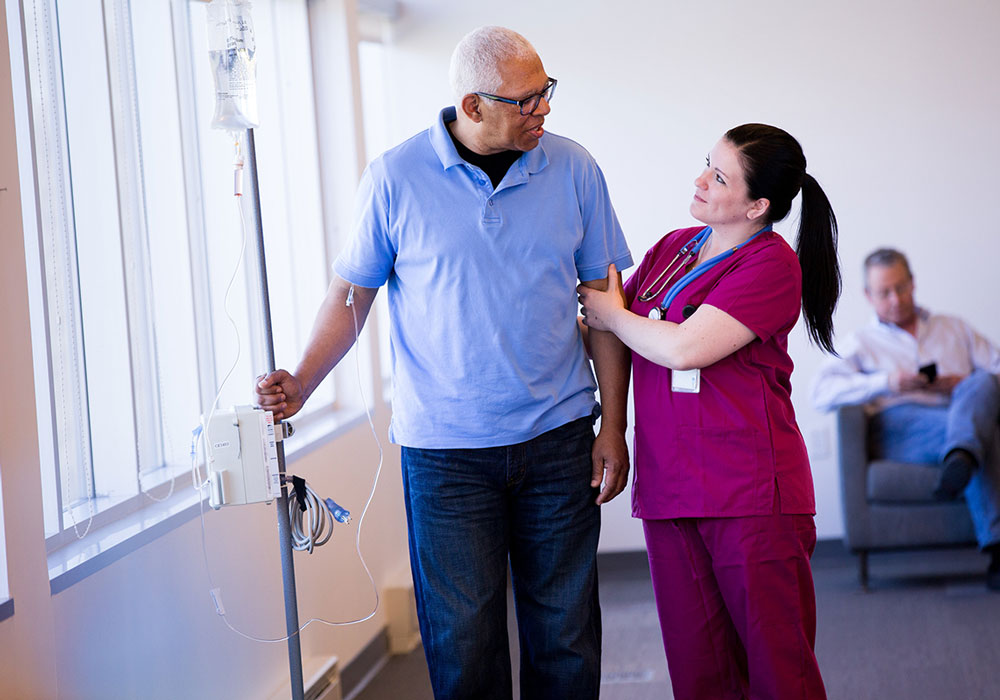By Kristin NiCastro, RN, BSN, OCN®
What makes a great oncology nurse? Is it opportunity and experience? Is it passion? I’ve worked with managers who’ve held wildly different opinions on these hiring characteristics, but I would argue they’re all critically important.
In many ways, experience is advantageous over a newcomer’s passion when looking to fill an open position in practice. Experienced oncology nurses are easy to train, they know the drugs, they understand the expected outcomes, they’ve dealt with side effects, and they are less costly to onboard for the institution. Experienced oncology nurse hires can be fully operational in the role much faster than someone needing extensive training in oncology.
However, a nurse new to oncology may have been driven to the specialty through her desire and passion to care for patients with cancer. Although she may initially know little about the day-to-day responsibilities, that nurse could bring an important set of qualities through her passion, energy, attentive listening, and hunger to capture new learning opportunities. I’ve always believed that nursing is a calling and working in oncology requires something special: a heightened level of compassion and dedication to our patients. Because of the nature of the diseases we treat and the relationships we build with patients and their families, an oncology nursing career requires just as much passion as it does experience.
Answering When Duty Calls
In clinics and institutions across the country, outpatient treatment for cancer is the norm. For many outpatient oncology nurses, working weekends, holidays, and nights are seldom required. Compared to inpatient settings and 10-hour or overnight hospital shifts, working in oncology can seem like an enticing schedule for nurses eying our specialty. But many of us have missed our kids’ plays, family weddings, and get-togethers with friends because we answer when duty calls.
Although it’s easy to see how a career switch to outpatient oncology would seem like a dream to some—here is the hitch—the reality is that many times we’re helping patients fight for their lives. That means we need to be 100% present and in this job for that sole outcome. When new nurses are interviewing for a role in our clinic, I listen for specific indications of true passion. I want to hear that journey story that drove them to this calling. The story about the family member with cancer whose compassionate nurse changed the patient’s life. I’m listening for that inner, emotional connection to oncology that illustrates the candidate understands the dedication and passion, fortitude, and empathy needed to start each day with a hopeful outlook for our patients.
Outpatient oncology nurses may work 8–5, Monday through Friday, but our patients don’t leave us. They’re at our dinner table when we eat, they’re with us in our dreams, they show up in the little things. As oncology nurses, we never punch a clock and call it a day.
Resiliency Through Self-Care
Oncology nurses have unique forms of distress. We’re working to heal our patients’ pain, to address the suffering of loved ones, but we also need to mitigate our own distress when we realize we’ve lost a patient who had been a huge part of our lives just days before. With all of the advances in cancer treatments, we now have years—not months—to inspire hope, provide help, and bond with patients in our clinics. But all too often, the emotional distress in oncology nursing goes unchecked.
According to Vachon, Huggard, and Huggard, as oncology nurses, “We must look after and respond to numerous patients and their families. Fully present. We listen to stories of sadness and despair. Intermittently, we either display or suppress emotions. All this takes place in an occupational environment where nurse well-being is nonexistent.”
Oncology nurse aren’t intentionally ignoring their stressors, but we’re so focused on caring for others that we often forget to care for ourselves. Self-care is an important aspect of oncology nursing, and, so we can be present and ready for our patients, we must find ways to help ourselves.
Providing the Best Possible Care
Treatments rapidly advance, and oncology nurses need to pursue continued education throughout their careers. It’s important to embrace our obsessive desire for new knowledge. We owe it to our patients, ourselves, and our profession. As we grow our practice and learn new interventions and treatments, we build our repertoire of remedies for patients.
Through experience, education, passion, and resiliency, oncology nurses can provide life-saving care for their patients with cancer. The calling to work with the cancer population is special: emotionally taxing but ultimately rewarding. By supporting ourselves and our colleagues, oncology nurses can continue to provide the best possible care to every patient we see.






